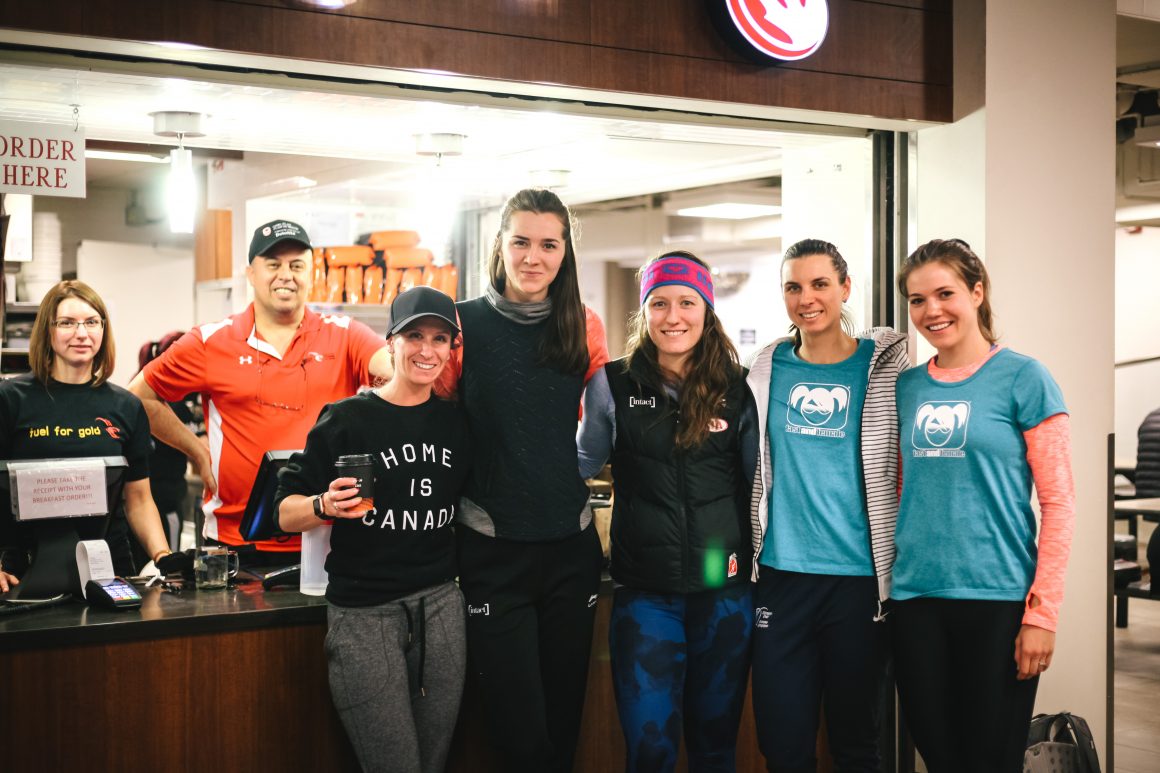
Olympians talk Fuel for Gold, training on campus
By Christie Melhorn, February 9 2018 —
As with many other students, my time at the University of Calgary was a blur of papers, working two serving jobs, camping in the library and hitting the gym in between. Some days, I barely had time to brush my teeth, let alone make a lunch. For three years, MacHall was my dining room and Fuel for Gold was my go-to. Their tasty lentil salad and Phil and Sebastian roasts pulled me through some grueling study sessions.
While Fuel for Gold was a staple of my degree, it was only last week that I learned of the business’s history. In 2001, Fuel for Gold was conceived by former Olympic cyclist Kelly Anne Erdman, now a renowned dietitian with the Canadian Sport Institute (CSI) Calgary, where she supports prospective and current Olympic athletes. Erdman has also designed nutrition programs for the Calgary Flames and most recently for the Canadian women’s hockey team.
Fuel for Gold first existed a kiosk in the Dining Center. It was open to the general public but structured meals and serving times around athletes’ needs.
“Originally, [Fuel for Gold] just did lunch. Typically speed skaters and swimmers training at U of C have their hardest workout in the morning,” Erdman said. “The timing of them getting that food is extremely important for recovery. They need it right away.”
In 2011, Fuel for Gold secured their current space in MacHall.
“Since we opened the kiosk in MacHall, we realized that our athlete population isn’t that huge,” Erdman said. “The majority of our clientele are students and faculty.”
Fuel for Gold head chef Fauzy Azouz says the establishment is a point of common ground for the athletic community.
“It’s not just about making money or simply making lunch. You become a part of so many communities and learn to tailor to cultural and personal preferences. Like the Dutch team would just want pasta before their races,” Azous said. “International teams come back yearly and we get to reconnect. It feels so good and like you’re a part of their athletic process.”
As a fundamental human need, food intersects with multiple aspects of our lives and affects our overall well-being. Erdman recognizes how food influences high-level performance and mental health.
“The exposure and the hype [of the Olympics] and extra pressure athletes put on themselves is a lot,” Erdman says. “Athletes’ time together as a team is almost always centred around food. They may not converse much during workouts but they socialize during meal time and de-stress.”
I experienced this first hand last week when I had the privilege of joining CSI Calgary Olympic long-track speed skaters for one last lunch at Fuel for Gold before heading to Pyeongchang the next morning. Over steaming plates of coconut chicken and rice, Kali Christ and Kerri Morrison discussed their mindset going into the games.
“I was in Sochi and didn’t race as well as I wanted. I need to better my mental preparation on the line at the games,” Christ said. “I have friends from other parts of the world in speed skating. A couple of us had a number of issues throughout the last four years so it’s really exciting for us to all be there together again.”
“My goal is to soak it in and not to shy away from the stress or the excitement but use it to fuel my energy in the games,” Morrison said. “My main event is the very last day. I want to enjoy myself but remain focused on my task.”
U of C biological sciences student Josie Morrison and geology major Isabelle Weidemann agree that the localization of important athlete resources on campus contributes to their success as speed skaters.
“It’s been really helpful to train at the Oval and then jump off the ice straight to class. I’ve been able to get my education and skate effectively,” Weidemann said.
“We have physio, massage, a pharmacy that proved ADA-approved supplements, and access to class — that cuts our commute in half and gives us more time to put towards other things that help us succeed in skating,” Morrison said.
International Skating Union (ISU) gold medalist Ivanie Blondin added that training on campus is convenient even for athletes who don’t attend the U of C.
“I may not go to U of C but everything is so accessible here. My training group travels a lot. Sometimes I literally don’t have time to go and get groceries,” Blondin said. “It’s nice to have places like [Fuel for Gold] to fall back on and eat athlete-friendly food.”
Across the eight different Canadian Sport Centres and Institutes in Canada, CSI Calgary is the only facility that offers a full-time food service program specifically for their athletes. CSI Calgary also dedicates profits earned by Fuel For Gold to providing higher quality resources to their athletes.
The Pyeongchang 2018 opening ceremony began at 4 a.m. this morning. Speed skating will kick off with the women’s 3,000 metre race on Feb. 10 and conclude with men’s final on Feb. 25. For the full speed skating schedule at Pyeongchang, click here and cheer on the many Canadian athletes who trained next door to you on campus.
